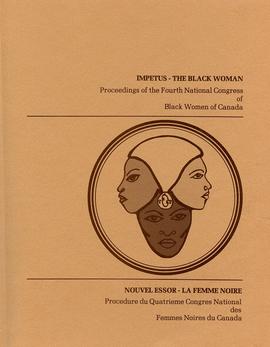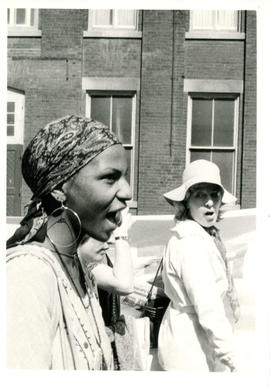Área de título y declaración de responsabilidad
Título apropiado
Tipo general de material
- Soportes múltiples
Título paralelo
Otra información de título
Título declaración de responsabilidad
Título notas
Nivel de descripción
Institución archivística
Código de referencia
Área de edición
Declaración de edición
Declaración de responsabilidad de edición
Área de detalles específicos de la clase de material
Mención de la escala (cartográfica)
Mención de proyección (cartográfica)
Mención de coordenadas (cartográfica)
Mención de la escala (arquitectónica)
Jurisdicción de emisión y denominación (filatélico)
Área de fechas de creación
Fecha(s)
-
1905-2014, predominant 1960-1992 (Creación)
- Creador
- Canadian Women's Movement Archives (CWMA)
Área de descripción física
Descripción física
1445 photographs
6 postcards
705 buttons
1622 posters
105 T-shirts
29 banners
Área de series editoriales
Título apropiado de las series del editor
Títulos paralelos de serie editorial
Otra información de título de las series editoriales
Declaración de responsabilidad relativa a las series editoriales
Numeración dentro de la serie editorial
Nota en las series editoriales
Área de descripción del archivo
Nombre del productor
Historia administrativa
The origins of what later became the CWMA/ACMF were the records of the Toronto feminist newspaper The Other Woman. When the newspaper ceased publication in 1977, Pat Leslie, editor of The Other Woman, moved the newspaper’s records into her apartment and was the custodian of the first Canadian Women’s Archives (CWMA) documents. From 1977 until 1982, she preserved The Other Woman records and some additional material relating to the Canadian Women’s Movement in her apartment. In 1983, working with a group of women including Nancy Adamson, Sandy Fox, Weisia Kolansinka and Lorna Weir under the banner of the NGO the Women’s Information Center (WIC) , a registered Canadian charity, an application was made for a Canada Community Development Grant. This allowed the group to rent a room in a building on the corner of Spadina Avenue and College Street in Toronto where they moved the documents from Pat Leslie’s apartment and it was here they began to collect records and documents related to the Canadian Women’s Movement. The CWMA Collective took responsibility for the collection from 1983 forward. That collective, which changed in membership over the years, operated the Canadian Women’s Movement Archives/ACMF, until it was relocated to the University of Ottawa in 1992. Members of the collective who were active for a significant period of time included: Nancy Adamson, Jane Abray, Karen Dubinsky, Sandy Fox, Debbie A. Green, Luanne Karn, Andrea Knight, Weisia Kolasinska, Pat Leslie, Anne Molgat, Beth McAuley, Johanne Pelletier, Margaret Shepherd, Miriam Ticoll, Tori Smith, and Lorna Weir.
After the opening of the public CWMA in 1983/84, the collection was catalogued and became available to researchers. Various grants, annual yard sales, and other fundraising allowed the CWMA/ACMF collective to hire staff from time to time, to actively collect the records of women’s groups across Canada and to promote the CWMA/ACMF. In 1991 the Collective decided that it was no longer possible to maintain the CWMA/ACMF as an independent organization and sought interest from other archives and universities in the collection. The Collective felt that the collection’s credibility rested on the fact that it came out of the women’s movement and was nurtured by feminists and operated in a manner consistent with those principles. As much as possible the Collective wanted to place the collection with an institution that would respect that. Ultimately, the Collective decided to donate the CWMA/ACMF records to the University of Ottawa. Both parties agreed that the CWMA/ACMF collection would be maintained in its entirety as a separate collection with the hope that additional records from the Canadian women’s movement would be collected by the Archives and Special Collections.
In 1992 the CWMA/ACMF records were donated to the University of Ottawa, who “took over the CWMA/ACMF’s mandate” and started accepting new donations that would become a part of an ongoing collection documenting the groups and individuals who made up the Canadian Women’s Movement.
------------------------------------------
Les archives du journal féministe torontois The Other Woman ont été à l'origine de ce qui est devenu plus tard l'ACMF/CWMA. Lorsque le journal a cessé de paraître en 1977, Pat Leslie, rédactrice en chef de The Other Woman, a déménagé les archives du journal dans son appartement et a été la gardienne des premiers documents des Archives canadiennes des femmes (ACFM). De 1977 à 1982, elle conserve dans son appartement les archives de The Other Woman et quelques autres documents relatifs au Mouvement canadien des femmes. En 1983, en collaboration avec un groupe de femmes comprenant Nancy Adamson, Sandy Fox, Weisia Kolansinka et Lorna Weir, sous la bannière de l'ONG Women's Information Center (WIC), une organisation caritative canadienne enregistrée, une demande de subvention pour le développement communautaire a été déposée. Cette subvention a permis au groupe de louer une pièce dans un immeuble situé à l'angle de l'avenue Spadina et de la rue College à Toronto. C'est là qu'elles ont déménagé les documents de l'appartement de Pat Leslie et qu'elles ont commencé à rassembler des dossiers et des documents relatifs au Mouvement canadien des femmes. Le collectif CWMA a pris la responsabilité de la collection à partir de 1983. Ce collectif, dont la composition a changé au fil des ans, a géré les Archives du Mouvement canadien des femmes/ACMF jusqu'à leur déménagement à l'Université d'Ottawa en 1992. Les membres du collectif qui ont été actifs pendant une longue période sont les suivants : Nancy Adamson, Jane Abray, Karen Dubinsky, Sandy Fox, Debbie A. Green, Luanne Karn, Andrea Knight, Weisia Kolasinska, Pat Leslie, Anne Molgat, Beth McAuley, Johanne Pelletier, Margaret Shepherd, Miriam Ticoll, Tori Smith et Lorna Weir.
Après l'ouverture de l’ACMF en 1983/84, la collection a été cataloguée et mise à la disposition des chercheurs. Diverses subventions, des vide-greniers annuels et d'autres collectes de fonds ont permis au collectif CWMA/ACMF d'embaucher du personnel de temps à autre, de collecter activement les documents des groupes de femmes à travers le Canada et de promouvoir le CWMA/ACMF. En 1991, le collectif a décidé qu'il n'était plus possible de maintenir l'ACMF/CWMA en tant qu'organisation indépendante et a cherché à intéresser d'autres archives et universités à la collection. Le Collectif a estimé que la crédibilité de la collection reposait sur le fait qu'elle était issue du mouvement des femmes, qu'elle avait été alimentée par des féministes et qu'elle fonctionnait selon ces principes. Dans la mesure du possible, le collectif souhaitait confier la collection à une institution qui respecterait ces principes. En fin de compte, le Collectif a décidé de faire don des documents de l'ACMF à l'Université d'Ottawa. Les deux parties ont convenu que la collection de l'ACMF/CWMA serait conservée dans son intégralité en tant que collection distincte, dans l'espoir que les Archives et les Collections spéciales recueillent d'autres documents sur le mouvement des femmes au Canada.
En 1992, les documents de l'ACMF/CWMA ont été donnés à l'Université d'Ottawa, qui a ""repris le mandat de l'ACMF/CWMA"" et a commencé à accepter de nouveaux dons qui feraient partie d'une collection permanente documentant les groupes et les individus qui ont fait partie du Mouvement canadien des femmes.
Historial de custodia
The Other Woman (1972-1977), Pat Leslie (1977-1982), Collective of the Canadian Women’s Movement Archives (1983-1992).
In 1992, the collective ceased operation and all the records were donated to the Archives and Special Collections of the Morisset Library, University of Ottawa.
The CWMA/ACMF made a decision to focus its collection on women’s movement organizations instead of individuals. After careful consideration and discussion about this philosophical and political decision to prioritize organisations over individuals, the Collective decided to maintain a record of individual donations but to separate the donated documents into the files of the various organizations. Though it was well aware that this was not consistent with archival practice, the Collective believed that organizing records in this manner both reflected the composition of the women’s movement and made the collection more accessible to researchers and activists.
The records in this fonds were acquired in different ways. Some were accumulated as part of The Other Woman’s activities. Others were sent to the archives when organizations ceased operations. Archives Collective members and staff actively sought donations of materials from organizations and individual women. Also, as it is the case for posters and flyers, some records were mailed to the CWMA (while in Toronto) at the time of publication. Members of the collective also donated records they themselves accumulated as part of their own feminist activities’ involvement. Finally, the University of Ottawa staff also added some records to the fonds after the 1992 donation, generally when a change of format for conservation purpose occurred.
Alcance y contenido
-
Cette collection contient des documents de différents formats, y compris des documents organisationnels, des affiches, des macarons, des t-shirts, des dépliants, des publications, provenant de plus de 2 000 organisations de femmes canadiennes, de conférences et d'individus. Les documents datent de 1960 jusqu'au milieu des années 1990 et ont été collectés par le Collectif des archives du Mouvement canadien des femmes.
Área de notas
Condiciones físicas
Origen del ingreso
Arreglo
Idioma del material
- inglés
- francés
Escritura del material
Ubicación de los originales
Disponibilidad de otros formatos
Restricciones de acceso
Condiciones de uso, reproducción, y publicación
Instrumentos de descripción
instrumento de descripción generado
Materiales asociados
Acumulaciones
Nota general
Identificador/es alternativo(os)
Previous fonds number
Wikidata Q identifier
Número estándar
Número estándar
Puntos de acceso
Puntos de acceso por materia
Puntos de acceso por lugar
Puntos de acceso por autoridad
Tipo de puntos de acceso
Área de control
Identificador de registro de descripción
Identificador de la institución
Reglas o convenciones
Estado de elaboración
Nivel de detalle
Fechas de creación, revisión o eliminación
Idioma de descripción
- inglés


![Demonstrators carrying "Canada condemns genocide in El Salvador" signs with Cindy Wright and Amy Gottlieb holding an " International Women’s Day Committee" banner, [Toronto]](/uploads/r/archives-et-collections-speciales/3/1/1/31135cea452348fbf252cf62897ce0df5784ac16039561e2e66812d196b1a36f/watermark_10-001-S3-I0891_142.jpg)
![[Margaret McPhail and Virginia Adamson] in a group of women holding musical instruments and an "International Women's Day Committee" banner during an abortion demonstration, Toronto](/uploads/r/archives-et-collections-speciales/d/8/b/d8bf84ad31deaf05a3498df97b210b32369dc309c23f25589c00414d5b6bc311/watermark_10-001-S3-I0133_142.jpg)




![Front view of [Gillean Chase], a member of the Gay Conference panel, attending the [Fourth Gay Conference for Canada and Québec], Toronto](/uploads/r/archives-et-collections-speciales-archives-and-special-collections/6/c/5/6c5dc00a7188fc0c3b12f30c38b167b3d4429f44515cc679e490a681b5f94180/c127b875-caf9-4f2a-9d47-502f204b7c8c-10-001-S3-I0855_142.jpg)
![Group of women and Adrienne Potts holding spuclums at [A Woman's Place, Toronto]](/uploads/r/archives-et-collections-speciales-archives-and-special-collections/5/a/0/5a076038c4b3eeafb7195e548b99ea1012a141a05d1916aa7dcccfa78a692b78/edf6a0a0-1ca5-4833-b555-dc3f2af05468-10-001-S3-I1066_142.jpg)
